My Firecracker (as my oldest daughter shall henceforth be known) was bitten by a dog when she was three.
Yes, this directly relates to the eating disorder, but in a roundabout, interesting way. Bear with me. 🙂
We were at a Bible study with The Firecracker and our newest baby, and she’d misbehaved in some three-year-old way. We made her sit on the steps while I was changing a nasty, leaky, baby diaper. Suddenly, I heard a dog snarl, The Firecracker scream, and looked up to see my daughter franticly trying to get up the stairs while the Bible study leader’s 15-year-old Collie had clamped down on her calf.
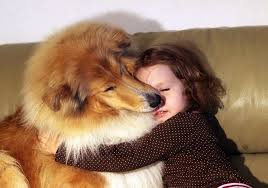
I left the baby to pee on the carpet, ran to my daughter, while the Bible study leader smacked the dog on the face, and got her to let go. There was a huge, bleeding bite mark on The Firecracker’s leg.
For years, she would not go near a dog.
She would shake, scream, and run away from the smallest little bleating yap-yap dog. She would cry, she would have accidents, she would even have nightmares about dogs chasing her.
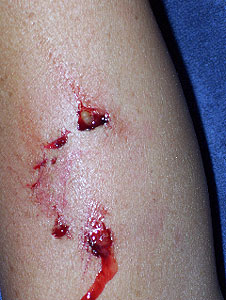
(image via google search)
All of this, in my mind, was a completely normal response to a very scary event. I never once told her, “It’s just a yap-yap dog! Get over it! It won’t hurt you!” Instead, I would say, “I know you’re scared, but this dog is too small to bite you, and I asked the owner to keep it in the basement while we’re here. Okay? Okay.” I would explain to dog owners, “Hey, I understand your dog is important to you, but The Firecracker had a really bad dog bite as a preschooler, and is afraid of all dogs.” Most owners understood, and some even helped allay her fears by holding a dog immobile while she pet it. “See? She won’t bite you. I won’t let her. You’re okay.”
One neighbor, however, had a dog nicknamed Juniper the Jumper. It was a huge chocolate lab that left muddy paw prints on EVERYONE and EVERYTHING. The kids, the postal carriers, the neighbors, and my new/used van all had the scratches and stains from Juniper’s “love”. That neighbor invited The Firecracker for a playdate, so I explained The Firecracker’s experience, and asked if the Jumper could be corralled, just while we were over.
The neighbor looked at me, bent down and looked at my then-five-year-old daughter in the eyes, and said, “You’re just going to have to get over being scared of dogs.”
We did not have a play date that day.
However, my Firecracker did gradually get over her fear of dogs. She understood that the dog who attacked her was likely sick, infirm, or otherwise crazy, and she has good relationships with her friends’ dogs.
As I’ve been learning about eating disorders, I’ve been amazed at what we *don’t know*. Until recently, standard wisdom was that anyone with an eating disorder had an inner need for control, and that they would not get better until they acknowledged that need, and asked for help. However, a couple of researchers at an eating disorders clinic theorized that a malnourished brain cannot reliably determine that it needs help. They decided to remain “agnostic about the cause” of eating disorders, and focus on re-feeding the patient.
This honestly gave me a lot of hope. Re-feeding is a horrible process, because as the body starts to get enough food, the patient’s behavior often gets much worse. There were tantrums, flailing episodes, a couple of “I hate you’s” and I still had to overcome her daily, hourly food refusals that usually focused on some detail of the food that wasn’t “just right.” The food was too hot. No, now it’s too cold. It’s too watery, no, now it’s too thick. I don’t LIKE it!! It’s DISGUSTING! HOW CAN YOU MAKE ME EAT THIS???
I would think, Dearest Firecracker, I can only make you because I love you, and I refuse to let you starve yourself. I know it’s hard. I know it hurts. I know something is bothering you…
Wait. What has her history been with food?
Well, the day she was born, she refused to eat. She didn’t eat for 36 hours, and it eventually took two lactation consultants and my Vulcan an hour and a half of holding her down and forcing her to latch on. It was horrifying. We attempted breast feeding for six weeks, before an online friend suggested she might have acid reflux disease. She was treated with Zantac, and immediately ate well.
(This is about to get gross, just FYI. Stop reading if you don’t have a strong stomach!)
At ten months old, we found out she had chronic constipation, and was backed up all the way to her stomach. She still has to take laxatives daily, to have any elimination at all.
At fourteen months old, she started developing a diaper rash that wouldn’t go away, which later developed into *blisters* on her rear end. Imagine what a diaper change feels like if you have blisters on your rear end. Then imagine repeating that process five or six times a day.
At eighteen months old, we found out she had an allergy to citrus, and the blisters went away.
By two years old, she became so picky with food that we could only reliably feed her Wendy’s Chicken Nuggets. Her doctor said she “probably” had sensory processing disorder, but it wasn’t “disruptive” enough to do any treatments.
We were able to gradually introduce new foods, but The Firecracker’s pickiness persisted. Oatmeal had to have *just* the right amount of water. Sandwiches had to have *this* brand of peanut butter, not that one. She could tell the difference!
At some point during the re-feeding process, I asked myself, “Could her experience with food have caused her so much pain that she reacts to food the same way she once reacted to dogs? Well, how did we overcome that?”

I started explaining aspects of the eating disorder to her, casually, in words she could understand. “Food used to hurt you when you were little, so now your brain thinks all food is going to hurt. Your brain is tricking you into not-eating. You need to tell your brain that eating won’t hurt. Eat all your cereal. Here, want another bowl?”
We need to buy stock in Cocoa Crispies right now.
I know a little bit about PTSD, and about strong-willed children. I’m used to explaining why I want The Firecracker to do something, instead of just expecting her do do it “because I said so.” I also lost four years of my life to selling retail jewelry, so I’m used to overcoming objections. Every. Single. Day. I’m also good with words. As I put all of this together, I thought, “God may have uniquely equipped me to help my own daughter through this.” That thought sustained me through the crying fits I’d have in the shower.
As we sat down to each meal, I would explain again that her brain and body were reacting to food the way she’d once reacted to dogs. “Remember how much you love Lucky now?” (Her best friend’s dog.) “You wouldn’t have touched Lucky two years ago, but now you love him! Don’t argue about the food. Eat it even if you think it won’t taste good. Oh, it doesnt’ taste good? Fine, let’s eat this instead. Firecracker, you love this. Will this bite you? Will this hurt you? Your brain thinks it will. You need to eat this much of it to re-train your brain.”
Finally, the breakthrough came one night when she asked, “Do I have to eat the cinnamon roll?”
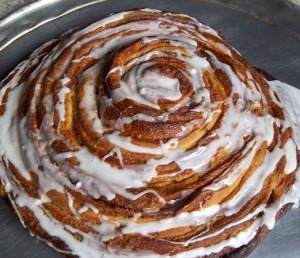
(I wish you could have seen the relationship between my daughter and cinnamon rolls two years ago. Yes, they had to be cut up, just so. Yes, they had to have just the right proportion of frosting-to-bread. But oh my gosh, she ate them by the pound.) I was leaning against the dining room wall as she asked that, and said, “Firecracker, do you hear yourself? You’re asking if you have to eat something that you used to sneak out of the kitchen!”
“Oh.” She said. “Oh wow. I really do have a brain disease that keeps me from eating. Will it hurt me? Do I have to take medicine for it?”
I went into the kitchen and quietly cried my eyes out, while The Vulcan explained the nature of eating disorders in a more rational, unemotional way.
Since then, meals have been astoundingly different. She cleans her plate, and announces, “Mom, I’m retraining my brain again!” She asks me if she’s eating enough. She points out how “people who are really stout” in the media are always portrayed as stupid, lazy, or undisciplined, and opines that it just isn’t right.
I’m so proud of her. The Firecracker is not out of the woods yet, because I know that any compulsive disorder can pop up again. I’m still having her evaluated on the last week of April. However, the friends I’ve spoken with who have an eating disorder say that this kind of self-awareness is a HUGE step towards recovery.
Please understand, I’m really just making this treatment up as I go along. I had no guidance from official sources, except for the eating disorder’s clinic nurse, who said, “Maudesly re-feeding is a good idea.” I don’t know if there’s any research connecting traumatic experiences and eating disorders. I also know that this doesn’t address her body image issues at all. There’s been no therapy or intentional discussions on body image recently, except for our typical family culture that refuses to disparage fat people, or praise thinness as a virtue.
After she started eating again, the Vulcan approached me quietly, and said, “I’ve been fasting one meal a day for her, since her first rejection episode.”
I admit, I was pretty….
Please keep praying for her. God is working and moving in her life.

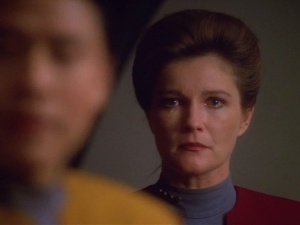
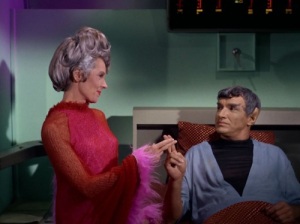
I’m so glad you guys have had a breakthrough!
LikeLiked by 1 person
Thank you so much!! You are so supportive. 🙂
LikeLiked by 1 person
Here’s to progress!
LikeLike
Thank you my friend!
LikeLike
So…Sage here. It’s awesome that she’s beginning to recognize where some of this is coming from. Knowing that helps a lot, feeling like you know why you are eating and why you are counteracting your body’s initial reaction.
Honestly, I think that eating disorders have as many causes as people affected by them, and no one approach will totally work for everyone. I can easily see that if Firecracker had a lot of pain associated with eating, it would have bad memories. Combined with stress and ridiculous media images, it sounds like it underlay what she is experiencing.
I never did Maudsely. I was put in an environment where I could not really count my calories because I didn’t have access to that information, and I was around a ton of people who ate normally (and were also very hungry–co occurring disorders treatment center, so most of them were withdrawing from drugs, which makes you incredibly hungry). Gradually I ate enough for long enough to realize that I felt better, healthier, and stronger if I ate. And even though I felt guilty most of the time, I told myself the similar things to what your daughter is saying: that I was retraining my brain to see food as a good thing, first as a fuel and then as something I enjoyed. Today, when I am tempted to not eat, or even skip a meal or two, I feel that empty feeling, the feeling that used to make me feel powerful, in control. But somehow it now feels dangerous and scary to me. I don’t want that feeling. I don’t want that constantly tired and crabby feeling. I have had to learn to work around food intolerances (I developed a lot of them on a particular med–thankfully they’ve resolved) but even with feeling crappy from them I kept trying because I knew it was dangerous not to.
This may make no sense. I just think that anything that changes the track from “food is the enemy” to “food is necessary and my brain has issues and I can’t always trust what I feel about food” is a good thing. I have heard a lot of research about eating disorders and trauma–mostly from the standpoint of eating disorders being a huge red flag for sexual trauma, but also from people who develop them after having food allergies/reactions/experiences that are painful.
Body image is an issue, sure. I don’t know what to do about that. It’s still actually really hard for me, but that has to do with gender issues. Seeing my body as more powerful than “pretty” has helped me a lot, but there is still work to do. The messages I as a woman get from the media are insidious and relentless, and body image is something I will probably have to combat forever. But body image is something that can be dealt with much more easily if your brain is not starving, in my experience.
Bottom line, I think eating disorders are complex. I think they are caused by all sorts of things. I think prescribing one kind of treatment is…ineffective. You know your daughter best. You’re combining keeping her nourished with knowledge about how she best responded to similar things in the past and educating her about what is going on. It sounds like it’s connecting, so what you are doing is working–and looking at it from a trauma approach has clicked with her brain and is giving her the mental stamina to keep herself going. You’re an amazing mom. Kudos. 🙂
(sorry this was long-winded…)
LikeLiked by 2 people
OH MY GOSH Thank you, Sage! That perspective is so invaluable, & I can’t thank you enough!!
LikeLike
You may want to look into possible autism spectrum issues. You’ve already heard the term “sensory processing disorder” (which often turns out to be autism). Pretty much all autistic people have sensory issues.
Also, there’s a substantial overlap between anorexia in girls and autism:
http://www.molecularautism.com/content/4/1/24
I’m not saying your daughter is autistic, but I would try to eliminate that possibility. Autism often manifests more subtly in girls than in boys.
Best wishes!
LikeLike
Amy, thank you so much for reading and for sharing that!! Yes, I think there’s a possibility of Asperger’s traits, and I call her dad “The Vulcan” for a reason–he’s very likely on the spectrum as well.
However, when I had her evaluated at age 2, I still had undiagnosed ADHD and anxiety, and she didn’t show *any* of her disordered behavior to the therapist. 😦 It broke my heart, and they concluded that my dysfunctional background was the cause of any parenting issues. 😦
However, since then, I’ve started taking video of any tantrums she’s had, or acting out behavior. AND, if she’s on the spectrum, she likely has ADHD also. The Vulcan and I both have it, and she’s shown many of the “working memory” problems. A person with ADHD who goes for an evaluation can suddenly **focus** and turn on their best behavior for a therapist! It’s maddening, but it’s why becoming educated about all these different issues is so crucial for helping our kids.
Thanks so much for stopping by, and please come back again.
LikeLike
Come to think of it, massive tantrums in older children are an autistic symptom.
http://www.myaspergerschild.com/2009/07/temper-tantrums-and-meltdowns-in.html
There’s also an interesting constellation of conditions where autism, ADHD, OCD and Tourettes as well as other conditions can co-occur in mix-and-match assortments.
http://en.wikipedia.org/wiki/Conditions_comorbid_to_autism_spectrum_disorders
“However, when I had her evaluated at age 2, I still had undiagnosed ADHD and anxiety, and she didn’t show *any* of her disordered behavior to the therapist. 😦 It broke my heart, and they concluded that my dysfunctional background was the cause of any parenting issues. :(”
Awful! A lot of diagnoses of autism spectrum issues only happen pretty late in verbal children. My daughter had a very difficult year in first grade, with an autism diagnosis by the end of the school year, and some get a diagnosis even later.
You might also get something out of Tony Attwood’s “Complete Guide to Asperger’s,” especially the sections on Asperger’s in girls and anything he has on comorbidity with ADHD (I forget what’s in there).
“The Vulcan and I both have it, and she’s shown many of the “working memory” problems. A person with ADHD who goes for an evaluation can suddenly **focus** and turn on their best behavior for a therapist! It’s maddening, but it’s why becoming educated about all these different issues is so crucial for helping our kids.”
Oh, yes!
“Thanks so much for stopping by, and please come back again.”
Thank you for the blog! I’ve learned so much!
LikeLike
Oh my gosh, that study is fantastic!! Thank you so much for the link!
LikeLike